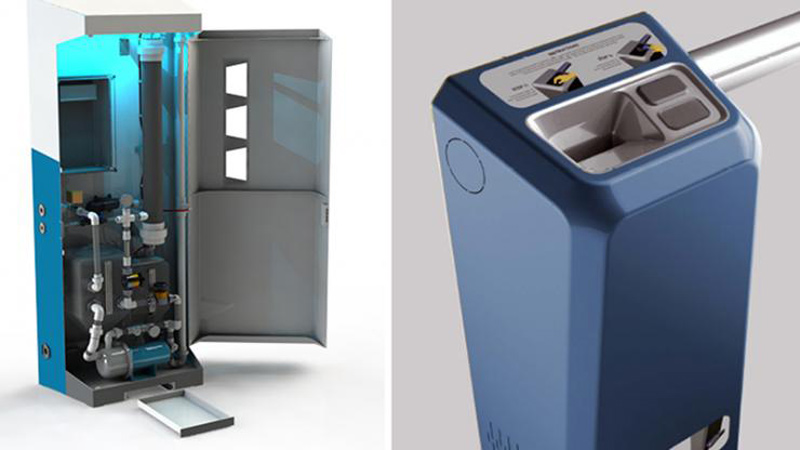November 19, 2018 | By Mara Shurgot
Plan includes densely populated Warangal in Telangana and Narsapur in Andhra Pradesh

The Indian cities of Warangal in Telangana and Narsapur in Andhra Pradesh will be the first two densely populated urban cities in the world to showcase an innovative reinvented toilet designed and engineered by the Duke University Center for WaSH-AID and their partners at Biomass Controls, LLC.
The reinvented toilet requires no sewer hook-up and processes liquid and solid waste on-site. Liquid waste is treated through active filtration, activated carbon and electrochemical disinfection, resulting in pathogen-free water that can be reused for flushing, irrigation or washing. The solid waste is homogenized, pelletized and dried—creating a pathogen-free solid that can be combusted on-site, burned as fuel or used as an agricultural supplement.
For the past few years, the reinvented toilet has undergone field testing in smaller communities in India and South Africa. This will be the first time the system will be located in urban areas, each with several million people.
The Center for WaSH-AID and the Administrative Staff College of India (ASCI) have signed a memorandum of understanding to bring the reinvented toilet to these two communities as part of a new Sanitation Innovation Hub. Established in 1956, ASCI is a think tank that informs public policy and increases capacity at the intersection of government and industry across India.
Srinivas Chary, the director of ASCI's Centre for Energy, Environment, Urban Governance and Infrastructure Development, and his team have worked with Narsapur and Warangal over the past five years to design city-wide sanitation models. Through the partnership, these cities have adopted a number of innovative approaches that involve key stakeholder feedback, new technologies, regulatory advances, extensive public-private partnerships, and significant investments in shared public toilets and households.
"These cities want to leapfrog and set new benchmarks in urban sanitation by adopting disruptive processes and technologies," said Chary. "Partnership with Duke University and Biomass Controls is a welcome opportunity and we are very excited to work with Dr. Brian Stoner and the research team at the Center for WaSH-AID."
ASCI will identify appropriate sites in Warangal and Narsapur in the first quarter of 2019 and WaSH-AID will install the reinvented toilets by the end of the second quarter. Chary and his team will work closely with WaSH-AID and Biomass to evaluate water re-use of treated discharge and evaluate any other bi-product outputs, such as biochar charcoal, for potential commercial applications.
As part of ASCI's effort to insure that the needs of women and girls are met, the reinvented toilet will include menstrual hygiene management, the S.H.E. module—a thermal treatment unit that incinerates sanitary pads without emitting hazardous gases or particulates. The team will also explore potential Biomass Biogenic Refinery sites—a community-scale solid waste processing unit that could process waste from a large number of reinvented toilets—a hub and spoke approach to sanitation without sewers.
"This is an exciting opportunity for our team to showcase the new reinvented toilet technologies, to solicit user feedback and to attract public and private partnerships necessary to accelerate the impact of non-sewered sanitation technologies in India and around the world," said Brian Stoner, director of the Center for WaSH-AID and research professor of electrical and computer engineering at Duke. "We are honored to be working with Professor Chary and his team at ASCI to make this technology part of the growing Sanitation Innovation Hub they are building."
Throughout the project, the partners will provide maintenance and educational materials in support of the toilets, solicit feedback from stakeholders, and disseminate this new knowledge by offering capacity-building programs for practitioners and other interest groups.
The Center for WaSH-AID is a translational research team that works closely with more than 20 academic, non-profit, and private industry partners to facilitate the development and sustainable deployment of novel technology-based health solutions for resource-constrained communities around the world.
Biomass Controls, LLC, is a U.S.-based company with offices in Durham, North Carolina, focused on developing solutions, including decentralized technologies with remote monitoring software, in response to water and sanitation challenges around the world.
